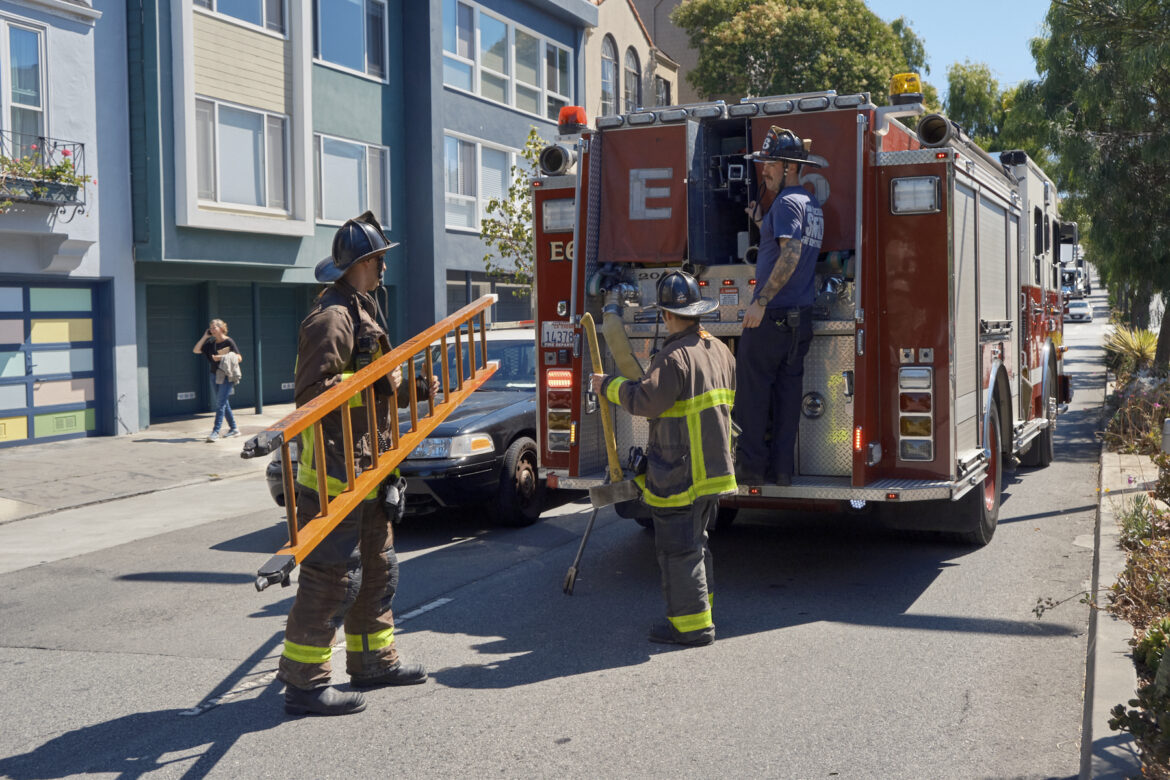See our November 2024 SF Voter Guide for a nonpartisan analysis of measures on the San Francisco ballot, for the election occurring Nov. 5, 2024. The following measure is on that ballot.
Proposition H would lower the age by which members of the San Francisco Fire Department could qualify for their maximum retirement packages, from 58 to 55, in an effort to encourage them to protect their health by leaving the work sooner.
Support
Earlier retirements could save firefighters’ lives by reducing their exposure to smoke and toxic chemicals, which recent studies show to be more harmful than previously known.
“We have to take a step to make things better for the lives of those who have come after us and the younger folks who have come in the department,” said Floyd Rollins, president of the union representing the city’s firefighters, at a July meeting of the Board of Supervisors.
The measure has the support of the full board and nearly every prominent candidate for mayor in this election.
Opposition
But one mayoral candidate opposes Proposition H: incumbent Mayor London Breed.
Breed is backing Proposition F, which would bolster the San Francisco Police Department’s dwindling ranks by allowing retirement-age officers to continue working while being paid pension benefits. Breed said that supporting both propositions F and H would be fiscally irresponsible as it would increase the cost of government at a time when City Hall faces persistent budget deficits.
“When you’re a candidate, you can promise the world,” Breed told the San Francisco Examiner. “When you’re mayor, you have an obligation to be a responsible leader.”
Sign up for our free weekly newsletter for reporting on local politics in San Francisco.
San Francisco, which has a $15.9 billion budget, is struggling to recover from the COVID-19 pandemic. Remote-work norms have emptied downtown offices and depressed commercial real estate values and tax revenues. Officials in July finalized numerous cuts to departments and services to resolve the latest projected deficit of nearly $800 million over the next two years.
The Libertarian Party of San Francisco also opposes Proposition H. The party’s chair, Starchild, said in the official opponent argument that it would overturn voters’ “prudent action” of 2011, when they approved today’s pension rules. Starchild said those changes protected firefighters’ retirement packages by helping San Francisco avoid bankruptcy during the boom-and-bust cycle that culminated in the 2008 Great Recession — some other California cities did not fare as well. Proposition H shows a “lack of planning” for the next bust, Starchild said.
“Better to explore ways to protect firefighters and reward them for their heroic service which do not increase unsustainable future spending obligations,” Starchild said.
What it would do
Today, firefighters and other fire department staff hired before Jan. 7, 2012, can qualify for their maximum retirement packages by age 55. Those hired on or after that date can qualify by age 58.
If passed, Proposition H would make all department staff eligible for their largest retirement packages by age 55.
Cost
The estimated annual cost to implement the measure would be about $3.7 million in the first year and increase as more firefighters started their retirements earlier. City Hall would cover the difference by taking on debt — and interest rates would push total annual costs even higher, possibly reaching $21.2 million by 2041, said City Controller Greg Wagner during the July meeting of the Board of Supervisors. Costs would later fall as the debt was paid off, Wagner said.
Those estimates do not include the fire department’s potential expenses to increase its hiring rate, to fill positions vacated by firefighters who retired earlier, Wagner noted. It costs about $115,000 to hire and train a firefighter.
Campaign finance
As of Oct. 7, the “Yes on H” campaign committee had raised $1,397,950, according to data from the San Francisco Ethics Commission.
No group opposing Proposition H had reported fundraising activity to the city.
History and context
This ballot measure has roots in efforts, from over a decade ago, to rein city workers’ pensions, which were a growing financial burden on local government. At the time, when San Francisco’s budget was about $6.8 billion, the city controller projected that pension costs would grow to nearly $1 billion by 2021.
That was due to many factors, such as climbing wages and health care costs, and eligibility rules for pensions. Proposition C, passed by voters in 2011, sought to improve the city’s finances by altering those rules.
This included pushing back the age by which public workers became eligible for their full pensions, equivalent to 90% of their final annual compensation: Most personnel could retire with full pension benefits at age 65, raised from 62; for firefighters and police officers, the threshold became age 58, up from 55. The firefighters’ union supported Proposition C, as did the full Board of Supervisors and then-Mayor Ed Lee.
New findings on risks of firefighting
Recent research has better revealed the long-term health impacts of firefighting, animating supporters of Proposition H.
Exposure to smoke, toxic chemicals and fumes contributes to mental health problems, cardiac issues, chronic health conditions and, most notably, cancer — the leading cause of occupational death among firefighters, who have a 14% higher risk of dying from the disease than the general population, according to the official proponent argument for Proposition H.
Firefighters may suffer higher death rates from all cancers, including mesothelioma, which is especially aggressive and deadly, according to a 2020 study by the National Institute for Occupational Safety and Health. The study found that older firefighters had higher incidences of lung cancer, leukemia and chronic obstructive pulmonary disease, also known as COPD, correlating with exposure to fires.
Even firefighters’ protective clothing may be harming them. Scientists have long known that firefighters’ bodies have high levels of PFAS, or “forever chemicals,” linked to increased rates of cancer. A study published last year revealed that their clothing contained PFAS. And a study earlier this year showed that those chemicals became more concentrated in protective gear that was deteriorated or subjected to high temperatures.
During the July meeting of the Board of Supervisors, Lorenzo Rosas, a legislative aide to Supervisor Catherine Stefani, said that 300 active and retired San Francisco firefighters had died of cancer in less than 20 years, and female firefighters had breast cancer rates six times higher than the national average.
Rosas said that not passing Proposition H, and maintaining the status quo, would take a financial as well as a human toll. The firefighters’ union faced “$12.3 million in increased compensation costs, solely as a result of more firefighters’ cancer claims,” he said.
Votes needed to pass
Proposition H requires a simple majority of “yes” votes to pass.
Click here to return to our full voter guide.










